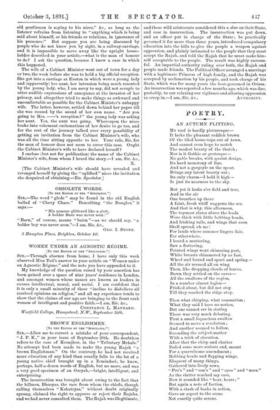BROWN ENGLISHMEN.
[To THE EDITOR OF THE "SPECTATOR."]
Sin,—Allow me to correct a mistake of your correspondent, -" J. P. K.," in your issue of September 26th. He doubtless refers to the case of Keonjhur, in the "Tributary Mehals." No attempt had been made to make the young Rajah "a brown Englishman." On the contrary, he had not received more education of any kind than usually falls to the lot of a young native chief brought up in a Zemindari; he knew, perhaps, half-a-dozen words of English, but no more, and was a very good specimen of an Ooryah,—bright, intelligent, and enterprising.
The insurrection was brought about owing to the fact that the hillmen, Bhooyas, the race from whom the chiefs, though calling themselves " Kshatryas," without doubt originally sprung, claimed the right to approve or reject their Rajahs, and we had never consulted them. The Rajah was illegitimate, and these wild aristocrats considered this a slur on their State, and rose in insurrection. The insurrection was put down, and an officer put in charge of the State ; he practically governed it for more than three years, introduced compulsory education into the hills to give the people a weapon against oppression, and plainly intimated to the people that they must accept the Rajah, and told the Rajah that he must make him- self acceptable to the people. The result was highly success- ful. An impartial authority ruling over both, the Rajah and people made friends. The Political Officer arranged a marriage with a legitimate Princess of high family, and the Rajah was accepted by acclamation by his people, and took charge of his State, which was for many years the best-governed in Orissa. An insurrection was reported a few months ago, which was due, probably, to our relaxing our vigilance and allowing oppression


































 Previous page
Previous page